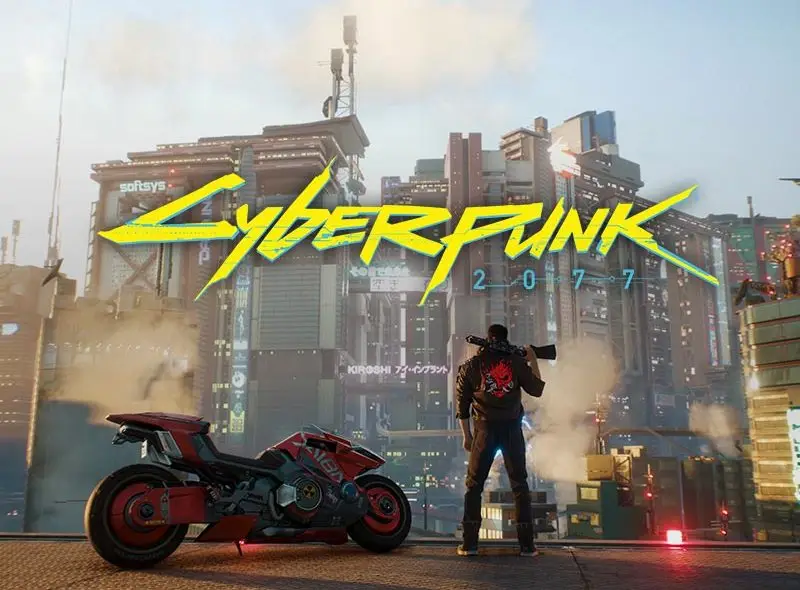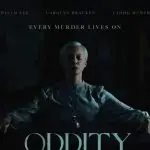Warning: This piece contains spoilers for the game Cyberpunk 2077 (2020). The Prologue section spoils only the prologue while the 2023 Phantom Liberty DLC is not touched upon until its own section in the latter part of the piece. If you have not played the game and do not want to be spoiled on any aspects, I’d suggest not reading this piece.
The Witcher 3 is one of my favourite games of all time, so when CD Projekt Red announced their next project Cyberpunk 2077, it shot up to becoming my most anticipated upcoming game despite not being the biggest fan of the cyberpunk aesthetic personally. Fast forward to release and the state it was in, I decided to wait it out and play it when the game was functional rather than have my experience compromised by a less than ideal level of polish.
When the game then soft re-launched with brand new systems and a new DLC, I figured it was time to try the game again. For context, I’m not an expert gamer – I don’t play at very high level difficulties and I’m not too concerned with gameplay aspects as long as the mechanics work. I like video games for the interactivity and simulation of things I could never do in real life. I look more for a great narrative that invests me and makes me feel emotions when things happen.
Despite the state the game launched in, I did not hear too many critiques of the narrative of the game. Some promised aspects were definitely half-baked such as the level of decision-making and the difference stemming from the choice of background at the beginning of the game. Although I don’t necessarily disagree with those things and it definitely would have elevated the experience if the game actually delivered on those, I think focusing on those is ignoring the plethora of great things the game actually succeeds in.
This piece will explore the narrative, the characters, the themes and the overall great journey the game brings you on. I’ll first cover what the prologue sets up followed by an exploration of V as a character as well as Johnny Silverhand and the myriad supporting characters that shape the journey of the narrative, both in the base game and the Phantom Liberty DLC.
This piece is not written to give a play-by-play recap of the game’s narrative, but instead jumps more to the analysis of what occurs. However, I have tried to contextualize most of the analysis so that if you don’t remember everything, it should jog your memory and if you haven’t played the game, well first of all, go play the game, but secondly, the analysis should still make sense. Those who have played the game and have a decent memory of it though will get the most out of this.
Prologue
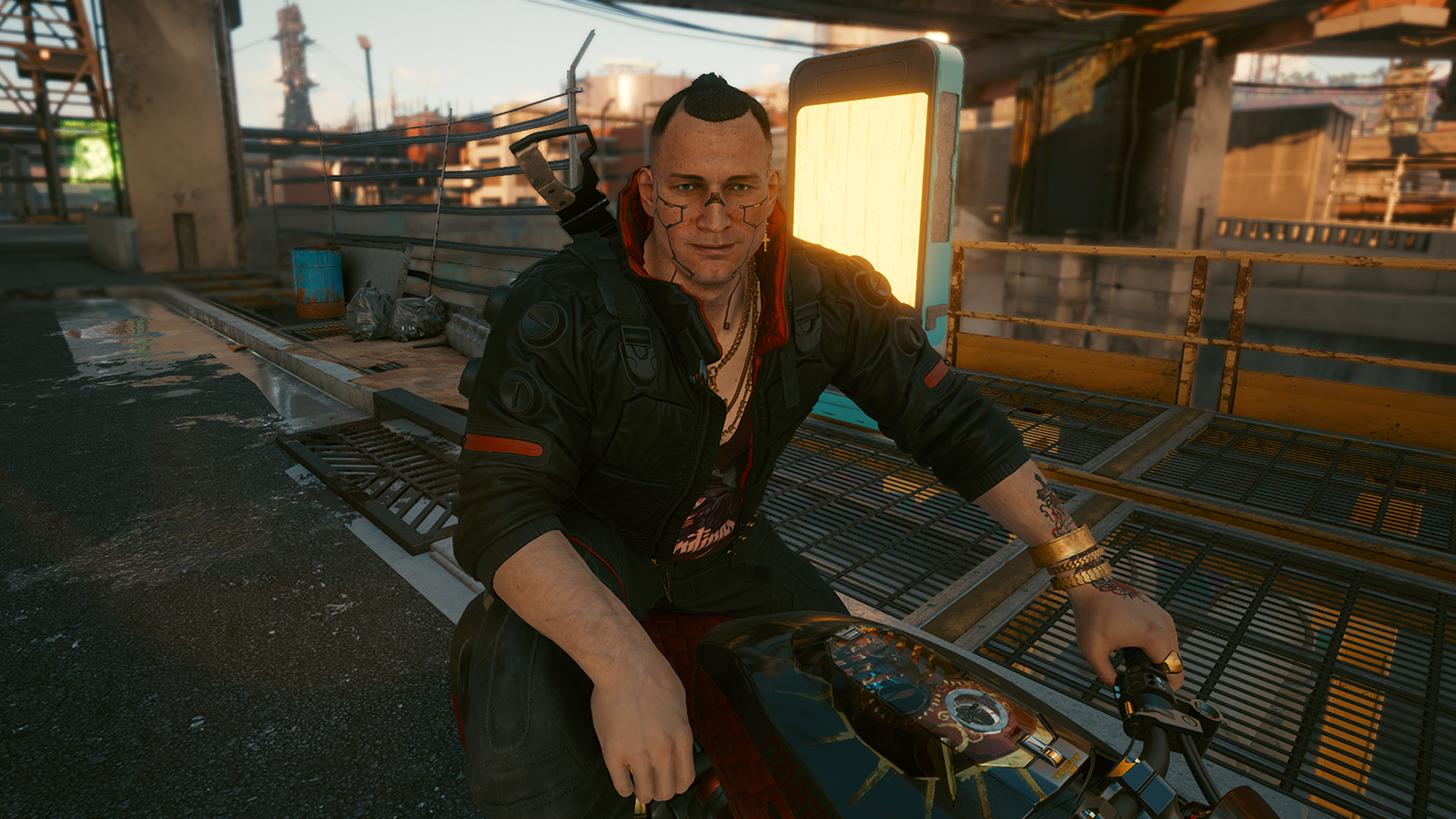
The heart of the prologue in Cyberpunk 2077 is setting up the strong bond between our protagonist V (Vincent or Valerie depending on which gender you chose) and Jackie Welles, an ex Valentino gang member who now did gigs on the side. His own backstory is the first sign of the strong writing present throughout the game. In a very short time, you start to feel kinship with Jackie who introduces the player to the lingo of the game’s world like choom, preem, and gonk, which later will become so normal that you don’t even notice these words as being foreign anymore. His character also epitomizes the melting pot that is Night City. His latino heritage is very present in him as a person, whether that be in the way he talks, his family and connections or just his everyday references. No matter which path you choose, Jackie and his mother along with Misty, his girlfriend, become the only entourage V has in their life.
In almost no time, the game shows you the depth of its worldbuilding and the care taken to craft its characters. The prologue would not work if the game were not able to establish these things. Very early on, we see the theme of family. Jackie’s family, which becomes V’s family, is what anchors both of them in the story and keeps them grounded as characters, straying away from what could have easily been generic protagonists.
Jackie’s story also drives home a principle theme of not just the game, but the cyberpunk motif across media: class divides. Jackie is a street kid. He didn’t have many paths to follow to break out of the chains of the environment he was born into. Despite the protests of his mother, joining a gang was a natural inclination for someone in his position to gain any level of autonomy in a city that binds those to the fates of their birth.
Jackie’s dream to hit it big and become a legend so that he could have the life he dreamed of for himself and his family is difficult to not get behind. Even though the method he’s using to get there may not be legal, the way that life in 2077 is set up, there is no other way. In that sense, compared to most you see in the game, Jackie’s motivations are easily the best. In his pursuit of dangerous outcomes, his driving force is to improve the lives of those around him. Even V cannot claim to have similar altruistic goals in mind.
– Jackie Welles
“I’m always never not nice.”
Jackie is just so hard to not love that you almost see what’s coming next. In classic fashion, the character set up to be the heart, soul and moral compass for the protagonist meets an early fate as he’s flatlined at the conclusion of the prologue in what was to be the gig that finally made Jackie and V legends in Night City and would allow them to achieve the things they had set out to.
– Jackie Welles
“Death is but the final flourish”
The ending of the prologue makes it very clear just how prominently Jackie served as the glue for everything you’d done thus far in the game. V’s connection to Mama Welles and Misty fray as soon as Jackie is out of the picture and the player is now alone to deal with what is to come their way in the game. V never really had a family; he just had Jackie. Although many in the game will stress that in Night City, you should trust no one but yourself, the prologue makes it clear that friends and family are what get you through things.
Jackie’s personality also is what really engages the player into the game in the prologue. After his death, you have the opportunity to speak to Padre about him, who muses about Jackie being in heaven:
– Sebastien “Padre” Ibarra
“I don’t know if God left the meeting happy, but I’m pretty certain Jackie did.”
As V is also killed only to be saved by the Relic that he inserts into his brain not knowing what the consequences might be, the words that Jackie lived by and that V has the choice of reading at his ofrenda loom large:
– Ernest Hemingway
“When you go to war as a boy, you have a great illusion of immortality. Other people get killed, not you… Then, when you are badly wounded the first time, you lose that illusion, and you know it can happen to you.”
V now had to start their life again after a rude awakening for him that he’s not as invincible as he may have thought. Without Jackie, he had but his memory and his words left. No matter which life path you chose for V, it is clear that the V after the prologue is nothing like the V before the prologue. Although now, it was just V, his moral compass is forever altered by his time with Jackie.
Already in the prologue, we see this theme of wires and chains. The things that connect us both literally in terms of cyberware in this world as well as figuratively with those around us but still being bound by the chains of the system in place.
V
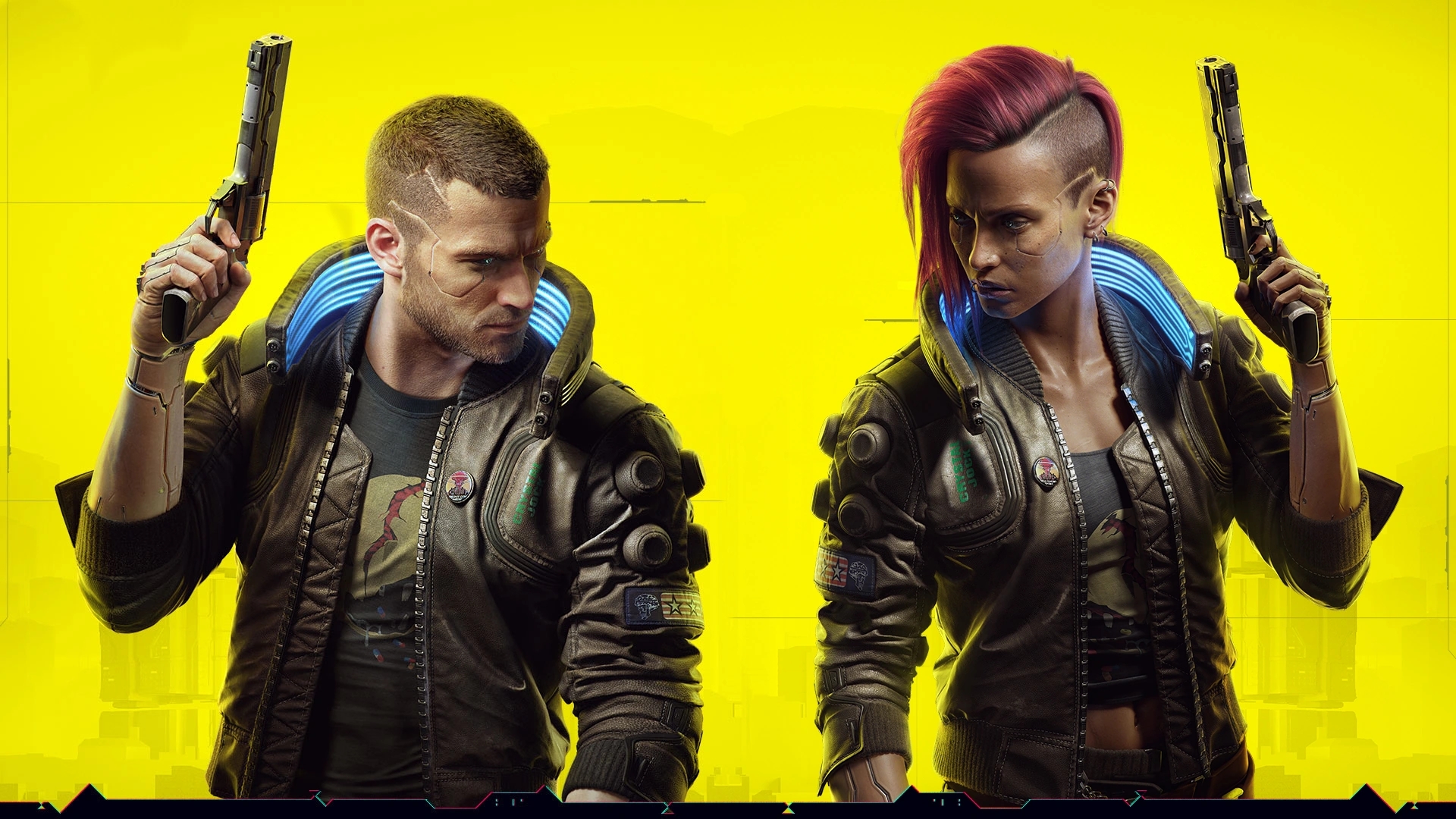
The journey that V takes in many ways is dependent on how you as a player decide to roleplay things. Outside of purposefully choosing to handle things in a malicious or unstrategic way, the general journey remains the same. The main factor where this may divert from one playthrough to another is how the player decides to handle Johnny Silverhand’s shadow over V, so I’ll leave that part of the discussion for the next section on Johnny specifically. Now putting those aspects aside, let’s talk about Vincent/Valerie and their journey as they hurtle towards inevitable tragedy.
– Delamain
“We all lap up the last of our fuel eventually. But that hardly means the journey wasn’t a joy.”
Once V susses out the mechanics behind Johnny Silverhand being in their head and that their psyche will be taken over by Johnny over time, it’s do or die. Most likely, V will wither away as Johnny takes over his body, but the player is also not a fool. We know that the narrative will end up giving us a way out. Nothing in Night City is straightforward though. There’s a cost to every outcome and as V, you get more and more desperate to put everything on the table to get to the ends you want.
However, V’s journey to get to the end point is what makes them such a great character. There are very few games where you play in a first person perspective that can get you as invested in the protagonist as Cyberpunk does. Outside of the odd mirror here and there, you never actually see V’s face. Most games touted for their character work are played in other perspectives, but generally in third person. Whether that be CD Projekt Red’s own The Witcher 3 where you see Geralt throughout or games like God of War or The Last of Us, the emotions and expressions on the characters’ faces is a big part of what allows us as players to feel invested in their stories. On this point, I’d like to applaud the exceptional work of V’s voice actors Gavin Drea and Cherami Leigh. Without their inch perfect deliveries of their lines, it would be a hard sell to feel like V. For the keen-eared out there, you’ll also notice they don’t always have the exact same lines or deliveries as each actor makes the role their own.
The game takes the brave step of exposing you early on to V as being vulnerable. You can deck them out in whatever cool garb and cyberware and weapons you like, but the danger at hand is something that none of those can overcome. Whether you choose to roleplay as someone giving in to Johnny or fighting back, it is evident throughout that V is in a fragile state of mind.
At first, it’s less evident as V focuses on figuring things out and is not ready to accept that they are now chained to their fate. However, as they move through quests and conversations, reality starts setting in. One such instance is on a holo call with Judy where she discusses the relationship people used to have in the past with the dead. Although she didn’t mean it in a way relating to V, it starts building blocks of V as a walking corpse.
– Judy Alvarez
“Once upon a time, people were talking to graves & nobody batted an eyelid, right?”
The part of the game that really drives this home though is when V is on the hunt for Evelyn Parker, a doll that was part of the job that turned V’s life on its head. As part of this, they go to Clouds, the establishment she was employed at. Although they don’t find Evelyn there, his search leads them to spending some time with another doll – in my case, it was Skye, but that may differ on playthroughs depending on V’s gender. As part of the experience, the doll downloads the user’s psyche, making them the person who understands V the most, perhaps even more than himself. She understands V’s fears and his sudden shift in perspective about life and death.
– Skye
“Fear isn’t a weakness. It’s there to protect you.”
V then starts to open up more, realizing that this is the one situation where they can just say what they’re really feeling. As the conversation advances, Skye asks V what their ultimate goal is. This is where Jackie’s lasting impression comes through and V answers the following:
– V
“I just want the world to know I was here. That I mattered.”
This interaction takes place relatively early in the game but it’s lines like these that resonate with anyone listening that make you relate and get invested in V as a person rather than just a vehicle for the player’s actions. The journey they then go on does ensure that the world knows that they’re there, but perhaps not in the way they had planned it.
V had planned to become a Night City legend by pulling huge jobs and gaining notoriety in the city. Although the game’s mechanic where you gain street cred as you complete more jobs does reinforce this aspect, V themself don’t necessarily achieve their goal of people knowing they were there through this. The true way they achieve this is by building bonds with those around them and realizing that it’s not the city they need to be remembered by, but the people that knew you best. Much like in the game’s motif, V wires a connection to others to find who he really is.
– Misty Olszewski
“We shouldn’t fear change itself, but only who we might change into.”
V definitely changes as they move along, helping friends and learning to care about others’ problems. Of course, the trappings of the RPG genre makes this hard to ignore of course. Which RPG player will turn down questlines? But it’s the art of taking that instinct of players to accept every quest and turning it into a character arc that’s really impressive here. These quests are not just checklists to increase stats. They’re used to make you relate to the plights of nomads or address the exploitation of sex dolls or get to the bottom of police corruption in the city. Getting the player to see the various facets to life in Night City and realize that outside of those at the very top, everyone has been dealt a less than ideal hand. Sure, V wasn’t dealt a great hand either, especially once the Arasaka job went sideways. But he can empower those around him to improve their lives even if he may not have much hope for himself. He could have gone down a different, more nihilistic path, but the game allows you to instead invest in being someone others can count on even when you can hardly count on yourself.
This turnaround is in stark contrast to early in the game when V nearly attempts suicide at the thought of their new life, thinking there was no way out.
– Misty Olszewski
“Well, that way you’d kill two souls. Is that what you want?”
Outside of the introspective aspects of V, you also get the opportunity to change their motivations in life. You may start off as a punk trying to make a name of themself and doing what they were doing for the sake of it. It is pointed out to them by many but perhaps best by Takemura who stresses the importance of the intent of why you do things rather than just focusing on the things you do. This puts into stark contrast the narrative V was otherwise peddling although not explicitly: no one’s hands are clean so who cares what I do. In the early parts of the game, this remains the case. But by the end of the game, when you learn more about yourself, but also Johnny and Arasaka and everyone else, the motivations change.
– Johnny Silverhand
“It’s not about Arasaka. Not even about life and death. The principle, V. It’s always about the principle. Swap meat for chrome, live a BD fantasy, whatever – but at the end of it all, it’s the code you live by that defines who you are. Ever get lost, it shows you the way home. Bust up into pieces, it puts you back together again.”
In many ways, depending on which ending you take of course, but more likely than not, you are back where you started: going to Arasaka Tower. But now perhaps you’ve come with better motives than the first time – perhaps you’ve found it within yourself to break the chains that society imposed on you. It’s also a full circle moment for Johnny Silverhand, which makes this a good time to switch to talking about him.
Johnny Silverhand

– Information Entry
“He burned down half the city just to prove he was right and burned the other half just for fun.”
If V is the heart of the game, Johnny is the soul. That’s mostly just a double entendre joke but there is some truth to it. Keanu Reeves’ Johnny Silverhand lives up to his reputation of being a mercurial rocker terrorist with no regards for anyone or anything other than his anti-establishmentarianism. For at least the first half of the game, the most accurate description for him would be “prick”. At first glance, this looks like the first sign of a slip up by CD Projekt Red in terms of writing. Inserting a one-dimensional aggressive character that comments on everything you do and acting as an almost antagonist in the story is a bold call that felt grating rather than something that was adding to the experience.
Part of the skepticism of this choice also stems from the fact that this is a massive departure from the types of characters in Keanu Reeves’ wheelhouse unlike the character of Solomon Reed in the Phantom Liberty DLC that will be discussed later. The mix of the jarring combination of actor to character along with the character being actively irritating could have been a recipe for disaster. Johnny also has the most lines in the game, clocking in at over 2,600 lines, eclipsing Panam Palmer by about 100 lines but doubling Judy Alvarez in third place (these figures do not include Phantom Liberty, as that would create an even bigger gap between Johnny and other characters). These are big swings that could sink the game altogether if it doesn’t gel.
Instead, I thought by the end of it, the game nailed it. Yes, he doesn’t seem to work right away. But in retrospect, that almost feels by design. He’s supposed to be invasive and bothersome. That’s how V sees it too. But as you spend more time with him and learn more about him and the way he sees the world, you start to build your own bond with him. Sure, he’s abrasive but he gives it to you straight from his perspective, which has been made extreme specifically to make you question your way of approaching things. At first, it sounds crazy… but as you advance in the narrative, things start to make sense. Sure, maybe you wouldn’t do it like him, but you can see where he was coming from. And to me, that’s the art in the writing of that character.
– Saburo Arasaka
“I have found that people lie, most often deceiving themselves. Not so the dead. The dead are so very, very loud. And yet, lying is not in their nature. It is so… humbling, to listen to the dead speak.”
It’s easier as a writer to endear a likable character to you; it’s much harder to take the route of deliberately pushing an unlikable character to you and get you to eventually come around to them and the person they were. It does of course help that there are aligned goals between V and Johnny. V’s ordeal started at Arasaka, the very place Johnny died in an international incident. Most roads then end up leading right back to Arasaka for both V and Johnny, who are now tied at the hip. Whether V had any real animosity towards Arasaka or not, it becomes clear over the runtime of the game that in the game of the powerful and the powerless, Arasaka is the one holding the key. In other words, I think very few players would not end up coming back to the same conclusion that Johnny got to when he died: Arasaka needs to be taken down. Although for V, it’s a progression, Johnny had already realized the megacorps’ chains that tied everyone down and he had done what he thought needed to be done.
The gradual progression of the player’s view of Johnny does not happen just due to Johnny although he also does soften up towards V as well. His ex-entourage plays a part in helping V realize Johnny was more than what is known about him. There are multiple quests that involve you giving control of your body over to Johnny to interact with his ex-friends and Samurai bandmates, but you as V also get to take over the reins at times too. I won’t cover the impact of every friend of Johnny’s, but I think both Rogue and Kerry do deserve to be talked about
Rogue Amendiares

Rogue is first introduced to the player as a fixer and the owner of the Afterlife Nightclub. It is through her that you meet Panam (more on her later). Her reputation precedes her as being a legendary merc back in the day but now resorting to just being a fixer for other mercs.
It’s not until later that you learn of her intimate connection to Johnny. In sequences that you experience from Johnny’s life, you find out that she was once Johnny’s partner until he cheated on her but she never did get over him fully. He then called upon her help to attack Arasaka to save his then girlfriend Alt and was involved in his final moments before death.
It is with her that Johnny for the first time seems to show regret for anything he’d done. He expresses that he should have treated her better and that she deserved to have had a better partner than he was to her. If you let Johnny take over V’s body, he then meets with Rogue and although you don’t see everything that happens between them, Rogue seems to have emotions and memories flood back that she had not thought about for decades. She quickly seems to gravitate towards V knowing that Johnny was in there, ingratiating him with a replica Samurai jacket that Johnny used to wear, showing that despite both their hardened exteriors, Rogue and Johnny shared something that had a lasting effect on her.
– Johnny Silverhand
“Haven’t forgotten a thing. Never will.”
Johnny and Rogue then are able to go on a drive-in movie theatre date together – something she had always wanted but Johnny never cared to get around to it. They discuss the mistakes they made and the things they would do differently if they had the chance to have those times again. These scenes reinforce that behind the nonchalant demeanour and the steely gaze, there was a part of Johnny that realized that even though he really did believe in his cause, the way he went about things was not the best. The vulnerability and humanity is what draws you closer to Johnny as a character. However, as things get intimate between the two, Rogue realizes too much time has passed and too much has happened for her to do this again. Although you recognize she’s right, you suddenly feel the pang of regret that Johnny does. Who doesn’t have times they look back on and wish they had done things differently so that things could be different today? Who doesn’t still have consequences of their actions that prevent them from being who they could have been?
– Rogue Amendiares
“Only an idiot does the same thing over and over while expecting things to work out differently.”
To me, these scenes with Rogue turn the character of Johnny from arrogant to tragic, and allows the player to relate to him.
Kerry Eurodyne
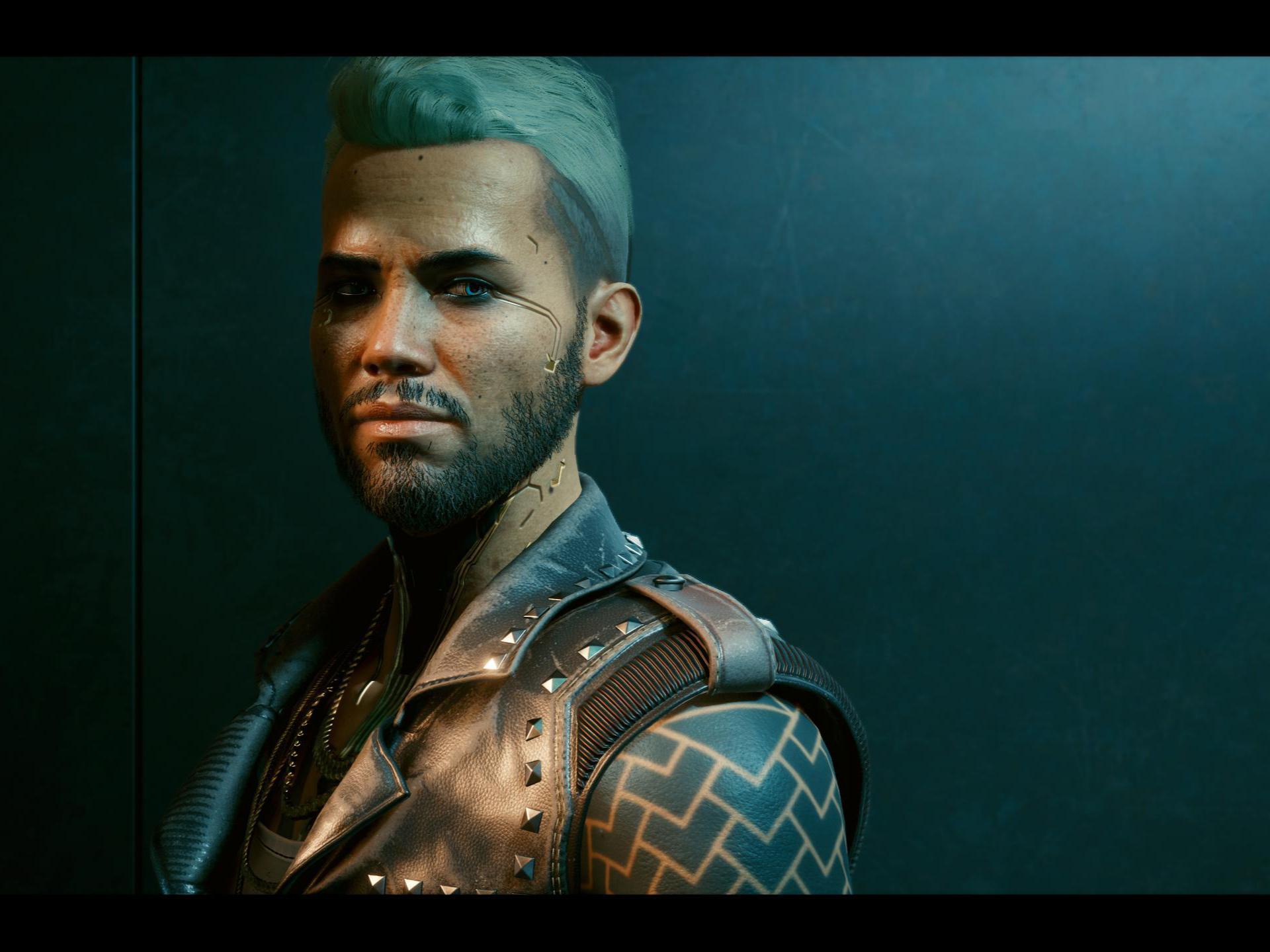
Kerry Eurodyne was the lead vocalist of Samurai who shared a vision of changing the world through music with his best friend Johnny Silverhand, but their perspectives regarding the execution of this plan often came to conflict. This led to Kerry’s multiple attempts at leaving the band, but, eventually, the complex relationship he had with his friend always pulled him back. At first glance, it’s a classic case of toxic friendship, much like toxic relationships, where there’s a strong connection but it’s clear that outside of that, they are not great for each other. On the surface, this relationship does not necessarily endear Johnny to the player, but it again humanizes him as someone with connections to other people and struggling with relations just like everyone else, whether he wanted to admit it or not.
In 2077, Kerry lives the stereotypical life that one may imagine an aging (whatever that may mean in this world) rockstar would. His career has been up and down, he has given in to what makes him the most money rather than what creatively fulfills him, and he is a hollow shell of the person he once was, having lost most of his friends and relationships.
As you go about meeting Kerry and learning more about him through a Samurai reunion performance as well as other quests with him, you start to see who Kerry really is and what a huge impact, both positive and negative, that Johnny had on him. Kerry has developed a lifelong fear of being overshadowed after Johnny became the lightning rod for attention for Samurai. Kerry epitomizes how character flaws such as being starved for attention humanize characters, especially when you spend the time to learn about its context and the toll it takes on people. Kerry almost seems to exhibit signs of PTSD from being in Johnny’s shadow, making him act erratic anytime he fears being in a similar position again. This is again shown if V decides to kiss Kerry to console him. Kerry’s first response is to ask if Johnny was present. At least this time though, he catches himself and mentions the passing of time and how he must move past those feelings, albeit unconvincingly.
Kerry later invites V to a yacht where Kerry works on making new music again from the soul after a long time. He starts finally coming to peace with the realization that Johnny’s heritage was not what made him successful, and that he himself is able to be successful on his own. Kerry then decides to close the door on being stuck in the past and moving past Johnny to focus on himself building his own life instead, no longer afraid of his own shadow. This is however followed by another show of fragility as V’s willingness to commit to a romance can either make Kerry relapse back to everything he said he was moving past or make him seemingly officially commit to being his own person, starting a new self-titled album to signify he can be himself.
– Johnny Silverhand
“See you in the next life, friend.”
Although this section examines Kerry, I believe his character is a direct reflection of who Johnny was and the impact he had on others. Perhaps in his endeavour to break out from the chains of the system, he didn’t notice the chains he was casting on those around him, whether that be Rogue, Kerry or other ex-friends of Johnny’s you meet along the way. Johnny does seem to come around as well, realizing that perhaps who he thought he was and what he thought of those around him wasn’t completely right. The writing once again does a great job of creating parallels simultaneously of the past actions of Johnny with the consequences 50 years later, giving him the retrospective to reconsider who and what he was. Those ties remain strong and reflect the person Johnny was, outwardly and inwardly.
As with V, the realization comes that the real way to be remembered is by the people around you and the connections you make, not the spectacle you create for strangers.
Supporting Cast
Night City

As odd as it may seem to include a city as part of the supporting case, it would be wrong of me to not address the life and personality of the setting of the game. Night City is the perfect depiction of a dystopian society while ensuring that it does justice to those living in it. Life is far from perfect, but people are still getting by one way or another. The game never inherently puts down anyone from any walk of life. Sure, different characters have their own views of different types of people, but that’s just a reflection of a realistic relation people have with their surroundings.
– Gr4ves by Konrad OldMoney and Kyubik
“The City of dreams, you live in your grave.”
The developers make sure that if you go through most of the quest lines, you come to realize that no one’s life is perfect in this city. There is a quest that has you help someone in a small house having issues with their personality because of a braindance malfunction, another where you help out some street doctors trying to help the wounded on the streets, while contrasting that with being hired by candidates running for mayor to see who may be spying on them. You really run the gamut of being exposed to every facet of the city, shaping your view as more holistic than if you were to just go about it by following the main quest.
However, another clever way the developers have framed it by allowing you to not do any of the side objectives is they are letting you lean into what everyone in Night City is doing: looking out for themselves. The main questline is only about fixing your ongoing issue with the Relic in your head. Any amount of helping you do for others in it is just a means to an end, reflecting the attitude of the city, and perhaps letting us introspect on whether that’s just a 2077 fictional reality or is it something that we live every day.
– Panam Palmer
“The City of Dreams. I’d gladly kick the balls off the idiot who thought that one up.”
The one commonality you will find among the residents of Night City though is that everyone hates it. Those who benefit from Night City hate it for everything it’s not and those who are exploited hate it for everything it is. But lost in that shuffle is the vibrancy that’s come from the melting pot that the city is. The neighbourhoods are flush with different cultures and languages and peoples. When you contrast this to CDPR’s previous work in The Witcher 3 where the most diversity was the shade of white the characters were, this is a real tour de force. If you go to Pacifica, you will be greeted with the patois community while going to the aptly named Japantown or Little China or Kabuki will bring to life the East Asian cultures that form those areas. Santo Domingo and Heywood really reflect the history of the hispanic communities in those regions of the United States while ritzier neighbourhoods round out the city, giving way to those living the high life in the city.
The addition of Dogtown adds a whole other dimension to the dynamics of the city within the confines of the country, but I’ll save that discussion for the Phantom Liberty section.
Just driving through the city (badly in my case) made you feel like it was alive. People were doing their own thing and going about their lives. It is rare to find a city so well realized and lived in and I think the game knocked it out of the park in that regard.
Judy Álvarez
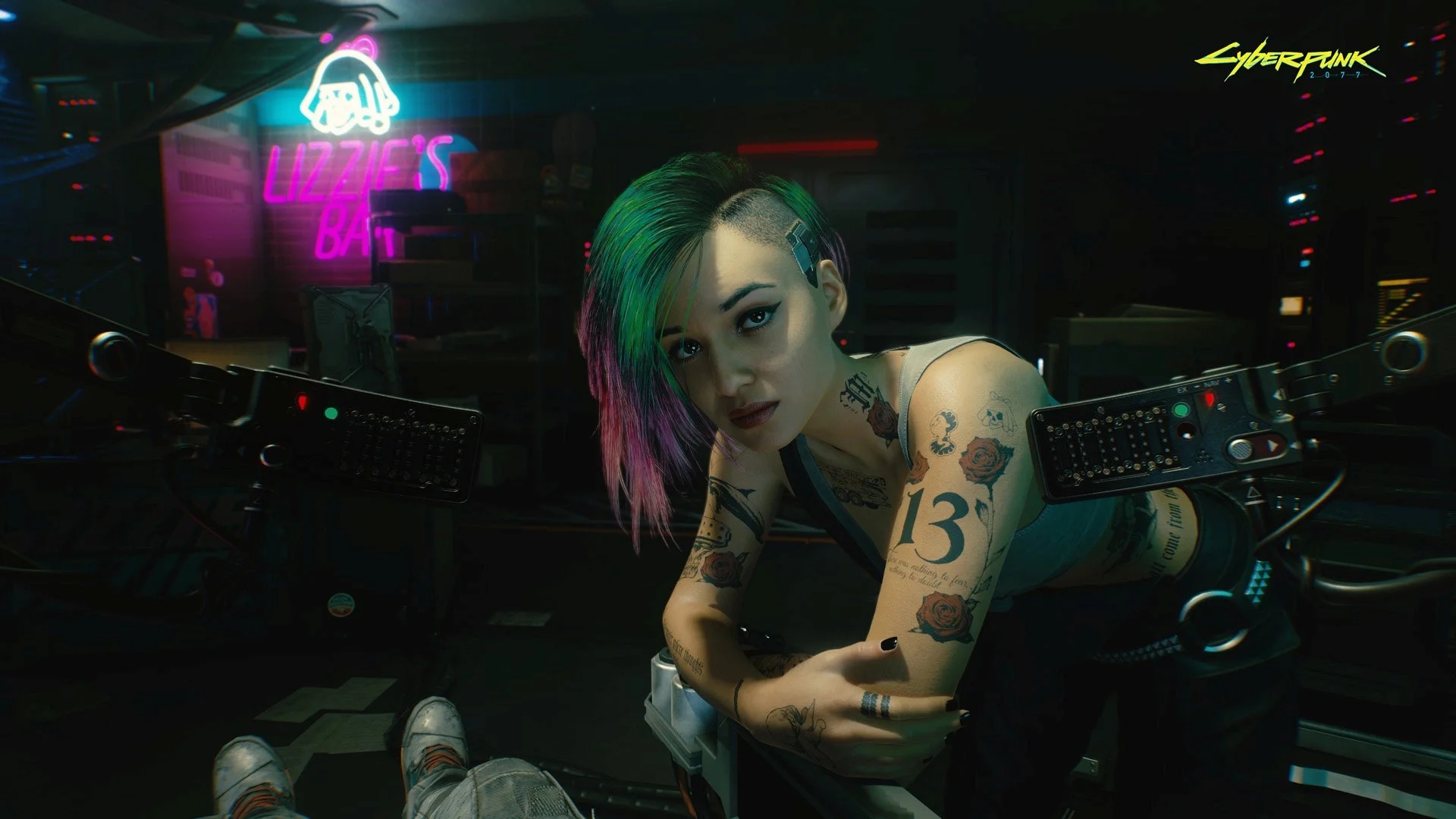
Judy Álvarez is one of the first major side characters that you encounter and build a relationship with in the game. Although she is introduced as a braindance editor who wants as little to do with you as possible, her story quickly evolves into one of emancipation from the destiny she was supposed to be resigned to. She is a part of The Mox gang who formed in reaction to a sexual brutalization of a stripper in Lizzie’s Bar. Their whole modus operandi is that they are women who are out to make sure they are safe from the aggression of other gangs, namely the Tyger Claws. Judy herself portrays much of this ethos by being a former braindance techie at a sex doll house that then goes back to try to liberate the dolls from Clouds despite what the consequences might be.
Judy’s story in the game is the epitome of someone taking their life into their own hands and the bravery it takes to not just do something for yourself, but for others who are unable to help themselves. Her questline takes us through a series of events that even the best writers could easily misstep, but instead the setup for a story covering sexual assault is done organically so that it does not feel gratuitous while giving the player and other victims the ability to exact revenge for the situation. Most importantly, the game never shuns sex work throughout this despite it being a very easy low-hanging fruit to reach for. The potential outcomes all consider the solution include the continuation of sex work, but in a safer environment for the dolls.
– Judy Alvarez
“The city has chewed me up and now it’s spittin’ me out”
Although the story of this emancipation does not have any legitimately great ending for Clouds, to me that’s a realistic way to write rather than allowing V to solve every issue that comes up in Night City. One way or another though, it does liberate Judy. Whether she solved the issues or not, she realizes that she did what she could, and perhaps Night City is just not the place for her. A character arc does not always need to be the success of one’s endeavours, but rather to get the character to learn something as they go through their endeavours and come out on the other side different from when they started. Although most of Judy’s endings lead her to leave Night City, it does seem like that’s what was the happiest outcome for her, and as V, enabling someone to get there is the satisfaction that they can take from it.
As an addition to this, if you do romance Judy, the interactions with her abuela are a lovely touch by the writers to once again deepen a character and show the care taken to craft her.
Panam Palmer
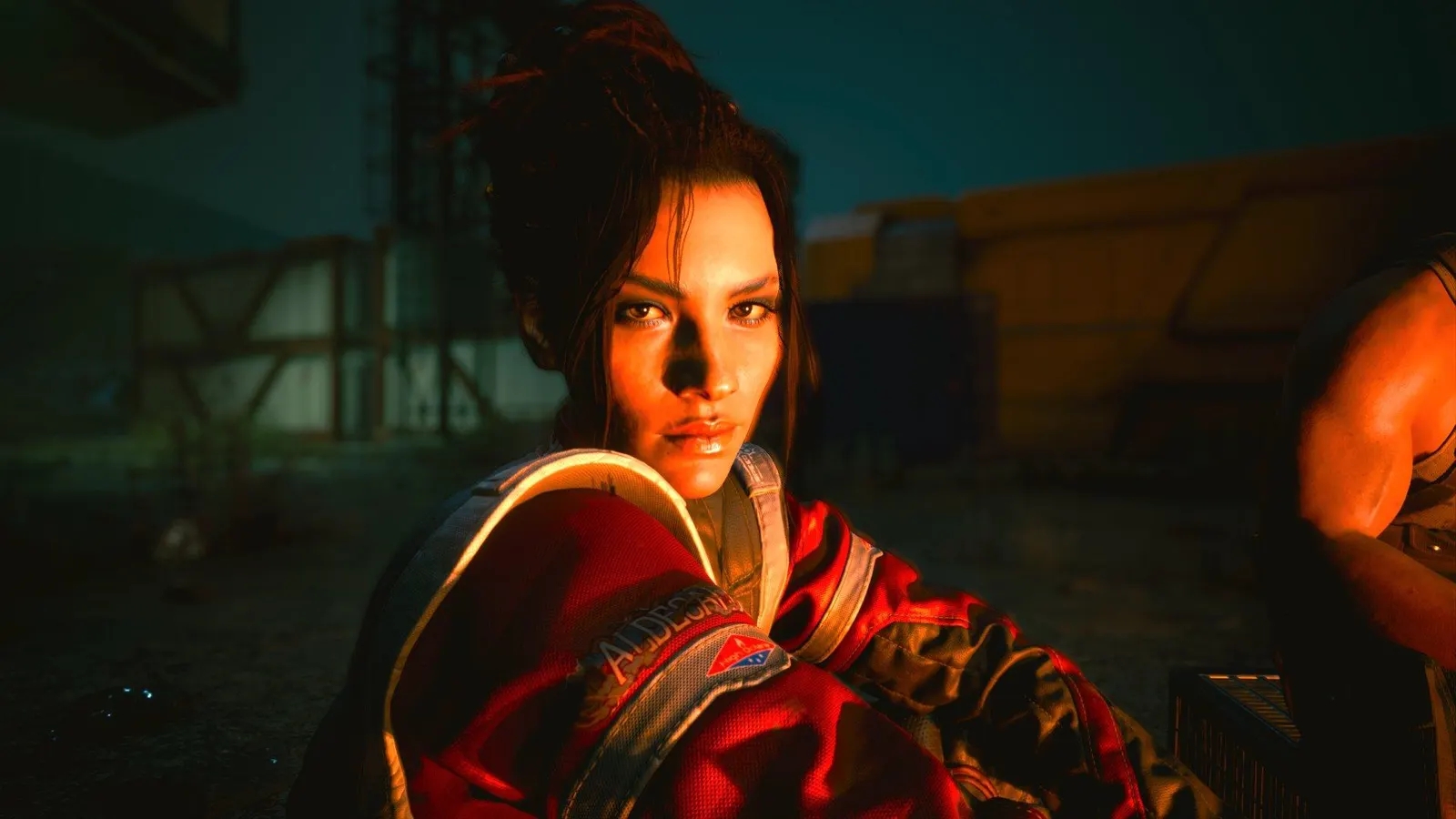
Although Panam isn’t introduced early in the game, she arguably is the most prominent character outside of V and Johnny in the game. Her introduction is through a quest for Rogue where you are trying to capture Anders Hellman, an architect of the Relic, but need the help of someone with knowledge of the badlands. Panam presents herself to be a headstrong woman willing to do whatever it takes for what she wants. She has strong values, but unlike many in Night City, she’s willing to trust someone else if she can get something out of it.
Out of the various complex characters the game introduces to V, Panam is probably the most cookie-cutter of the bunch. She checks all the boxes of a traditionally attractive strong female character romantic interest for the protagonist. It’s thus no surprise that Panam is one of the most popular side characters in the game.
This isn’t necessarily a critique of the writing of Panam. Tropes are tropes for a reason and when executed well, they work. Her yearning for freedom and to live her life on her own terms regardless of what others might think is aspirational for V, who sees himself trapped in more ways than one to his fate. Panam is the hand guiding you out of the deep end that V has mentally become mired in. Her warmth as a person accompanied by the exceptional motion capture for the character model comforts you in the least comfortable of situations.
– Panam Palmer
“The feeling of realizing freedom means nothing if you’re alone.”
Her questline also is the most fleshed out in the game compared to the others. Through her, you meet the Aldecaldos, the nomad group in the badlands that she calls her family. You meet Mitch, Scorpion and Saul and start to bond with them. Panam starts to remind V the value of family and togetherness and having others to lean on. Since Jackie’s death, V had become a lone wolf accompanied by just Johnny, but the various missions you go on with Panam deepen the need for camaraderie if V wishes to make the most of his time left or otherwise get help to sort out his predicament.
Most importantly though, I feel like Panam is the one V gets closest to. He learns about her life, steeps himself in the way she lives and the people she lives with, what makes her tick, and what life is like outside of Night City. Whereas I felt a lot of the deeper aspects of the other characters were more tell and less show, Panam feels the opposite. We experience this other life that is outside of what Night City is like through her, and conversely, she feels the most reactive to having V in her life as well, romance or not.
– Panam Palmer
“Let’s face it V. My life was in a million pieces. You broke it into a million more. But sometimes it’s only then that you can piece it all back together again.”
The bond with Panam also makes her and the Aldecaldos one of the only connections V makes that can potentially help V in his final assault on Arasaka. Panam in this sense represents more than the individual that she is, but instead the family that she and her Aldecaldos become for V. You may be able to buy many homes in the game, but if played right, the only place that feels like a home is when V’s at their camp surrounded by a bunch of people who genuinely seem to care about them after everything V did for the nomads.
Goro Takemura
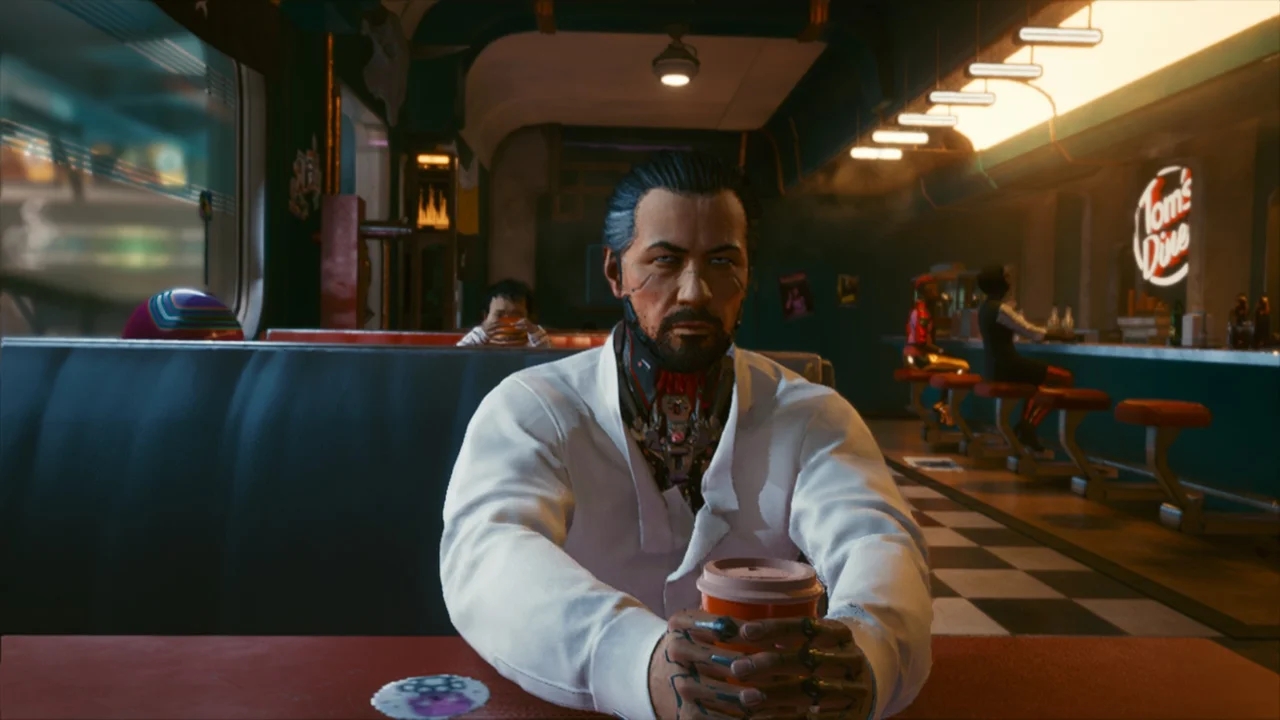
If Judy and Panam are V’s storylines to explore the street kid and nomad sides, Takemura is a plunge into the deep end of the corpo world. He represents everything the less fortunate dream of: someone from the slums who rises through the ranks to become an important figure for one of the most important people in the world in Saburo Arasaka. Unlike the other characters’ storylines however, Takemura’s is not optional. His storyline is intrinsically linked with V’s as they both make their way back to Arasaka for their own reasons. As their objectives align, they become hesitant allies.
Goro’s blind devotion and loyalty to Saburo is his defining feature when he is introduced. As events unfold though, his loyalty to not just Saburo but the system he helped uphold is shaken as he is brought to earth in more ways than one. Goro serves as a very different character than most V interacts with, as he is one of the few that has to take the journey to become skeptical of the corporate world while almost every other non-player character already holds those opinions. Whether you play as the corpo background or not, the writers take Takemura as an opportunity to also present the corporations in a positive light. Sure, things may have gone wrong, but he never fully turns against Arasaka. He sees them as his saviour from a life in the slums where he likely would have died sooner or later trying to eat or being eaten. It’s not a debt he is able to fully turn his back on no matter the direction the rest of his life has gone.
– Takemura
“There are no clean hands. But it is important how they become dirty. Arasaka gave me what no one else could – values I could honor, live for.”
For the player though, this presents a different perspective – one showing that this dystopian ultra capitalism also can have benefits to some who are otherwise hopeless. It is not meant to justify the system or these large corporations, but it does humanize the people who work there who themselves do not benefit from it more than the paycheque to live the life they want to live. It reflects how we should also think in our personal lives: the system may be broken and the rich benefit off the poor, but most do not have the choice but to participate in the system. There is of course a bit of a counterintuitiveness with this lesson and then potentially mowing down hordes of employees and guards in the game, but you are also able to take a nonlethal strategy if you desire to roleplay the depth of the messages the game is putting out. At some point though, the narrative of the story needs to be separated from the mechanics of the game because they serve different purposes.
Once again, V and the player are reminded that although we all make choices, we are often bound by the conditions we are born into and must do the best we can within those bounds. Most cannot break their chains, and even those who can may not benefit from doing so. We’re just all trying to survive.
River Ward
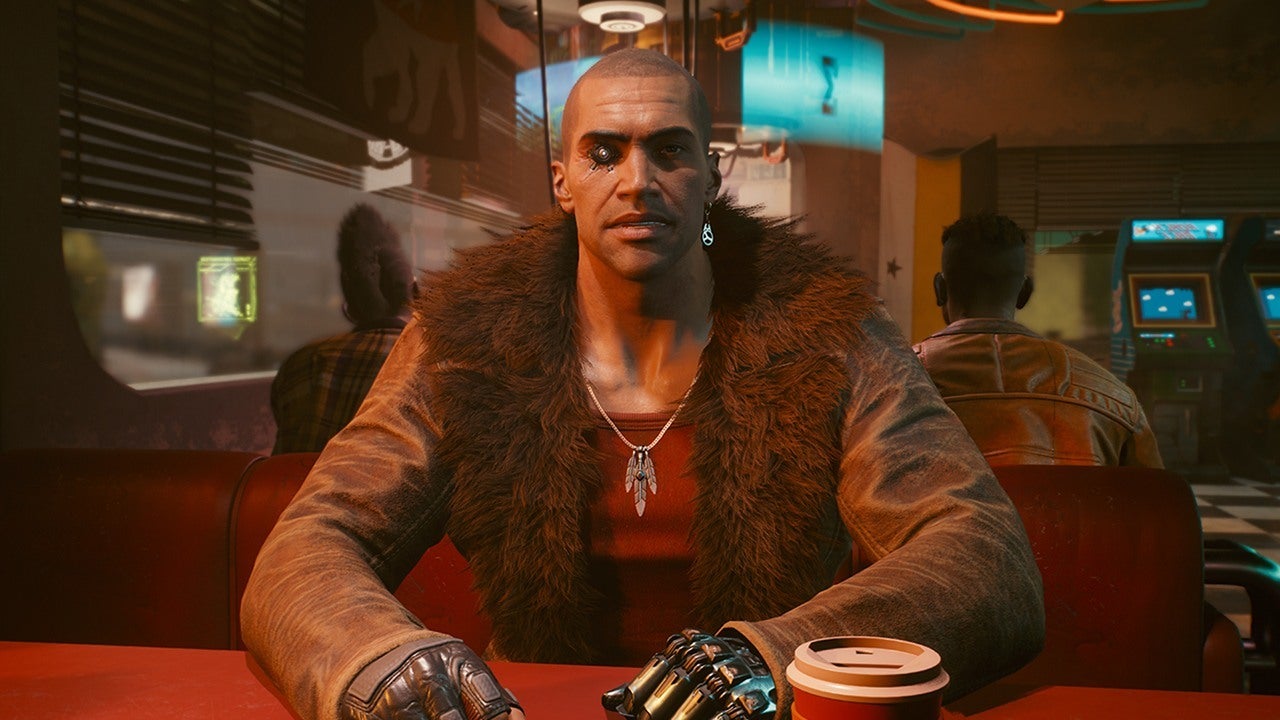
Unfortunately, River is a character that can easily be missed in the game if you are not intending to do more than just the mainline quests. He appears as a contact in a questline where you try to help some political figures try to figure out what happened in the death of the former mayor. Once again, the game takes the opportunity to get you to empathize with a group that you may not otherwise. River Ward is a detective for the NCPD and the only role police in the game really play is as antagonists to your everyday shenanigans in the city. The only other time police are shown in a different light is when a policeman neighbour of yours is having a depressive episode, leading to his suicide from the way he was treating in the police force. Although that questline is rather short despite its poignance, River’s has more depth.
Through River, you discover how policemen don’t have it easy either. Sure there are those that benefit from the power and take bribes, but there are similarly others like River’s ex-partner Jamie Sheen who committed suicide under the pressure of having to work in a system where cops take bribes to oppress the lower class. You later find out River’s current partner Harold Han is also corrupt, leading to frustration boiling over for River. As someone who had joined the force to do good, his world slowly unraveled in his time there, realizing that perhaps he was delusional to have ever thought that. Again, in this character, we see how deep the embedded societal standards are and that no matter what your intentions may be, escaping the grips of the system are beyond the regular person.
Despite this, the writers don’t just leave you with a sense of helplessness. They use River to show that your everyday actions and decisions are still your own. You may not be able to change how everything works or be exactly what you wanted, but every little bit allows you to make sure you remain who your ideal self is. When River had the opportunity to kill the serial killer who had abducted his nephew, realized he’d be no better than the thug that tried to make River shoot his mother when he was young if he went through with the execution. This one decision allowed River to still maintain his sense of self, whether others around him followed or not was their prerogative. I believe this is an important message to anyone: do not let others’ corruption corrupt you too. You do not have to walk the path most taken if that path does not reflect your values.
River’s final decision to l become a private investigator rather than a detective for the NCPD allows the game to say that yes, we are all bound by the chains of the system, but perhaps there’s more give than we might think if we’re just willing to pull a little.
There are many other characters within the game that can be discussed that provide further depth and thematic strength to the narrative as well, but this piece would be even longer than it already is if I tried to break them all down. Here are a list of other characters though that to me are very interesting in their own ways and do lot in their more limited screen time compared to the ones discussed:
- Hanako Arasaka
- Misty Olszewski
- Mr. Hands (moreso in Phantom Liberty than the base game)
- Delamain
- Evelyn Parker
Phantom Liberty
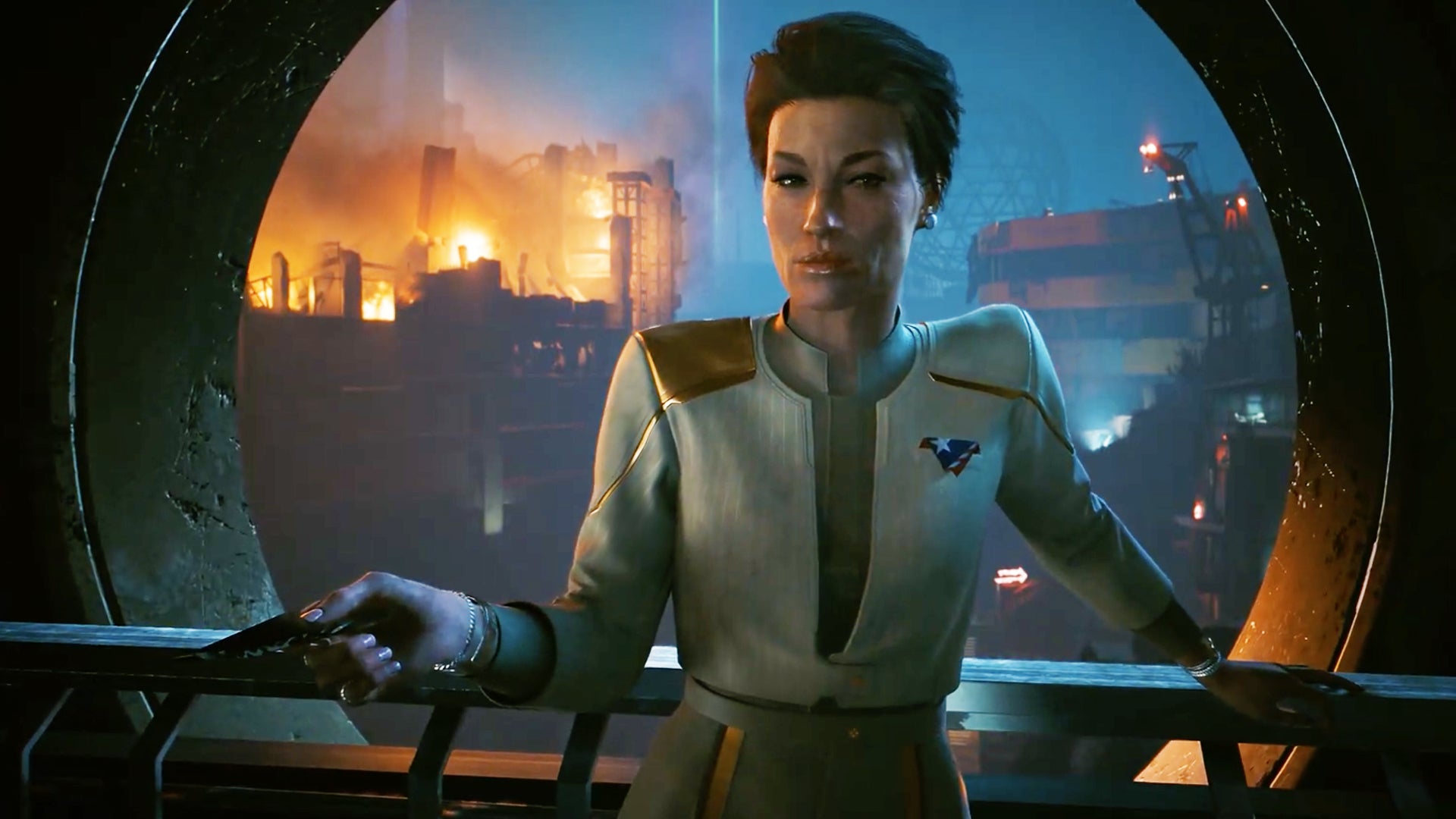
Phantom Liberty ideally occurs sometime in the middle of V’s story. Of course due to it releasing later that wasn’t an option for many who came back to the game after having beaten it just to play Phantom Liberty. It works very well as a standalone story as well, but integrating it into the main storyline makes it feel much more organic, especially when it comes to the new ending it introduces for V. Introducing a new area with its own vibe and dynamics gives the story a new facet and Night City another layer on top of the ones it had already established. In an otherwise smaller scale story that’s much more personal, it also introduces a much larger scale for V to interact with since one of the main characters is the president of the NUSA.
After the president’s plane crashes and V rescues her, V is sent on an adventure to peel back the ongoings of Dogtown and its leader Kurt Hansen in an attempt to get the president out of the area safely and to save Songbird, the netrunner that brings V into the fold with the promise that she can solve their predicament with the Relic. The narrative of Phantom Liberty is played out like a classic noir spy thriller that is still set in the Cyberpunk world. The potential outcome of being cured is enough of an attraction for V to go along with the whole story despite being unsure who is playing who and if there’s anyone they can really trust. Songbird may be dangling the silver bullet but with no proof outside of her very strong hacking skills that she even has this solution while Solomon Reed is an onion of mysteries as you discover more about him at every turn. At moments, everyone seems to be on the same side, but at other times, it is unsure whose values and motivations can be trusted. And in all this, in the end, it’s V who is the real wildcard.
The story can go many different ways in the end depending on which direction you decide to take things, but no matter what you choose to do, I believe the main characters of this DLC provide more perspectives and self-reflection for V.
Solomon Reed
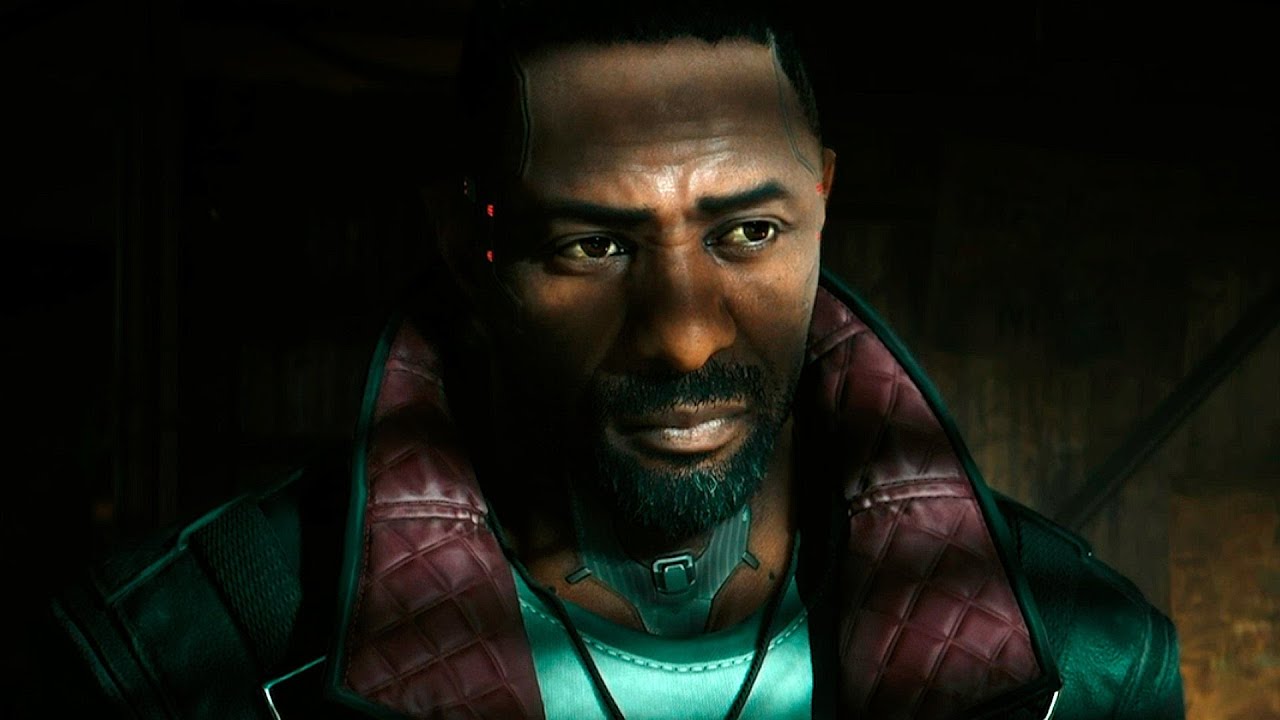
After rescuing President Myers, V is instructed to make contact with an FIA sleeper agent in Solomon Reed played fantastically by Idris Elba. With his help as well as fellow undercover FIA agent Alex, V is able to get Myers out of Dogtown and work towards saving Songbird from the clutches of Kurt Hansen. You are introduced to Reed as being one of the best agents in the NUSA who worked for one thing and one thing only: his values. The principles by which he lives are what make Reed who he is. He is willing to do whatever it takes for the best interests of the NUSA, no matter how tough the decisions on that path may be.
Reed is the one that makes V question everything. With his espionage background, Reed’s constant skepticism and second guessing starts to rub off on V as the Phantom Liberty DLC starts becoming a game of who wants what and why. Rather than clearing up, things get murkier the further you go – and I mean that in the best possible way. Questions bring up more questions and it’s hard to not get wrapped up in not only trying to figure out what’s happening, but it immerses you in your roleplay as V as you begin to peel back the layers of the onion.
In an anti-authoritarian setting such as this game, having the DLC revolve around a cast of characters who in some way all are or serve authoritarian figures makes for a much more interesting exploration of the cyberpunk genre. Solomon Reed is the conduit for the writers to humanize that aspect of the world and flesh it out so that the faceless government becomes more than just an antagonist and you start seeing it, much like everything else, for the people who make it up. Those people too have lives, aspirations, and values. Sure, being a merc is tough, but so being an FIA agent is all pain in the name of serving a country rather than yourself. Whether you as V agree with that or not, those who give their lives in the service do, and Reed is the ultimate example of that.
However, the writers are clever enough to not just make Reed a jarhead-type. Reed himself is a critical thinker – he knows those he serves aren’t perfect, but he has aligned himself with them because he sees that to be the greater good even if the smaller details are not always pleasant. On the other hand, it also serves as a cautionary tale that the road to hell is paved with good intentions. Reed has the best of intentions in his heart, but the paths he chooses do not end up being what’s best for everyone individually despite seeming to genuinely care about those people.
– Solomon Reed
“It’s nothing personal.”
When you first meet Reed, he sticks a gun against you but then apologizes by saying it’s not personal. In the moment, it makes perfect sense. But it ends up really epitomizing Reed as a character. He has connections, deep ones even, with Alex and Song. But in the end, when his mind is as one track as it is, no matter how cerebral and thoughtful Reed is, it never does end up being personal. His inability to bend on his morals becomes the chains that sever his connections to those around him, no matter the ending you go down.
Song So Mi (Songbird)
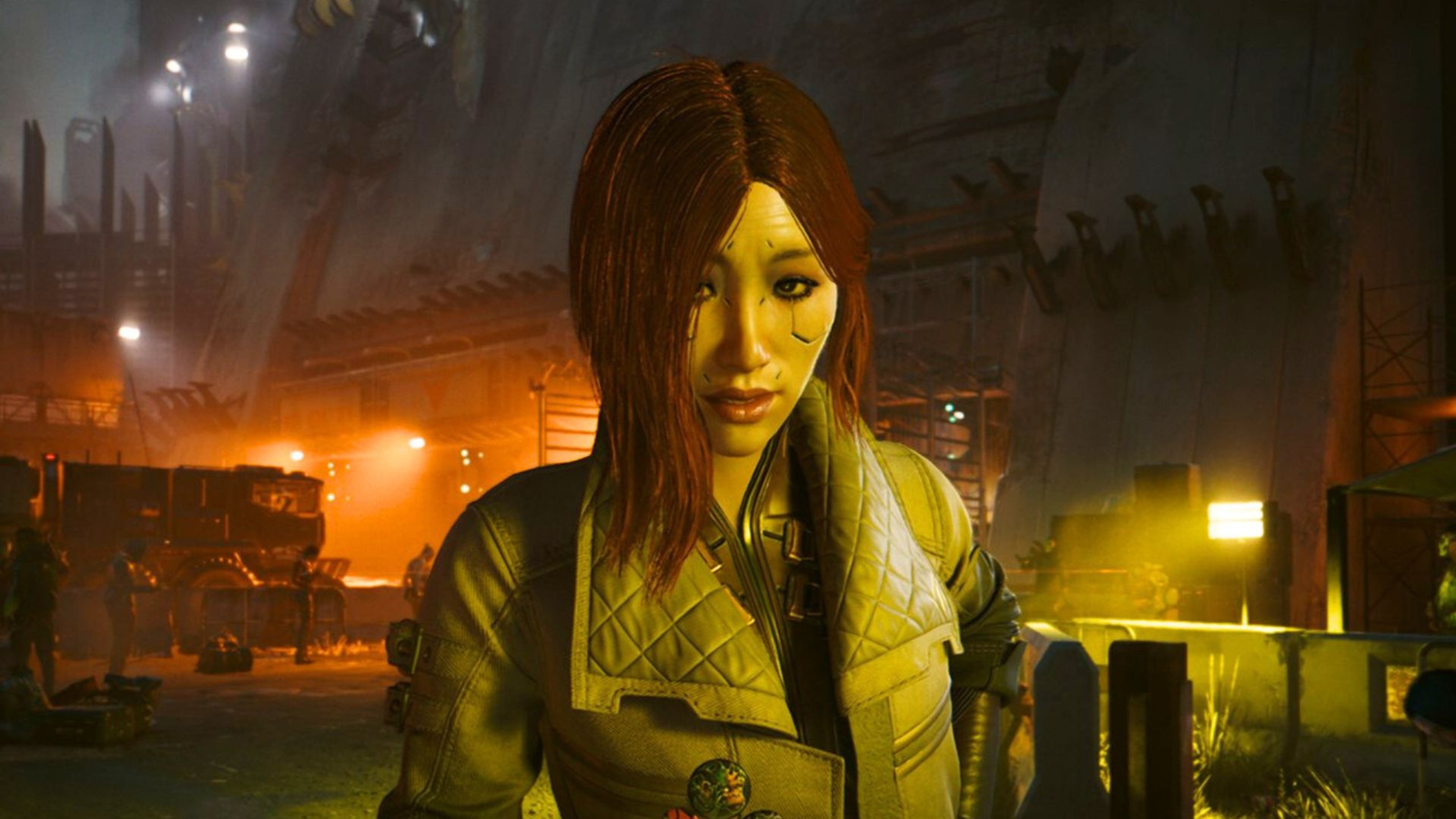
Perhaps a hot take, but I see Song So Mi to be by far the most interesting and complex character in the whole game. The position she starts from to the various endings you can go down with her are so meticulously crafted to be as bittersweet as possible, it’s hard to have any other character’s story really compare in impact. She starts off as seemingly nothing more than a quest giver to V with the promise of a potential cure, but becomes so much more throughout the runtime of the DLC.
As a talented netrunner, she didn’t choose to join the NUSA forces out of some innate desire to serve her country. She was caught in a bad position and being an FIA agent was her out. This already makes her more inherently relatable than Reed or Alex in the story who seem much more voluntary in their desire to do what they do. Her codename Songbird starts to take on a much deeper meaning than just a play on her name. As you learn more about her, you realize that much like a songbird, she has had her wings clipped and has become confined in a gilded cage of not just those trying to use her abilities but of the extensive cyberware that she had modified herself with.
The fact that her portrayal of herself in V’s mind was of someone untouched by modifications goes to show how little she wants to be what she had become at that point. The reveal of her true appearance is a shock that Song expected but you can feel the pain behind it and why she may have wanted to hide it at all. There is heavy implication that much of who and what she is has been against her will as it leads her closer to not only physically dying but having her mind shredded apart. Her personality itself is at risk as much as her physical being is. Much like a bird wanting to escape its cage, everything she does, whether underhanded or not, is in her desperation to save herself before it’s too late.
– Song So Mi
“I’m just another weapon in their arsenal. A tool […]. And weapons and tools? They don’t get to make decisions or choose […].”
As much as I’ve made an effort to explicitly relate each character to the title of wires and chains, I don’t think I need to do that for Song as it is clearly the most explicit one. Sure she made friends in Alex and especially her mentor in Reed, but she always knew they were never ones that took precedence over their greater goals. Song approached V because she saw a person she could see herself in – someone who could truly understand her plight. Although she knows that V won’t take her misleading you well, she confides in them because she knows more than anyone else she could talk to, V might empathize. Perhaps a more cynical player would not have taken lightly to her betrayal in the game, but I found it hard to see her in any way other than someone just doing anything they could escape the confines of her reality to get one slim chance at a life she never had. And I can’t blame anyone for doing what Song did to try to achieve that.
– Song So Mi
“To exist like this? I can’t. Let me die, help me die, please.”
Although not the first character that has pushed V to become selfless, I think none really push the envelope is making the player decide who their V really is more than Songbird. In the end, she never does gain her autonomy as her fate lies in V’s hands. Will V help her regain her wings or lock the cage she’s trapped in?
Phantom Liberty to me was a masterclass in writing within the game. Every little bit worked towards building the narrative of the intricately crafted world of Dogtown. Although I didn’t cover Alex specifically, her character served as the anchor to the story, allowing V to learn about people and the world they had entered through a softer lens than Reed presented. The whole story serves to really build up who you want V to be – are you willing to sacrifice others to rid yourselves of your chains or do you find your own way to help yourself so that you can do what’s best for the people you end up caring for?
Conclusion

I cannot express how much V’s journey had me invested in what would happen to V and everyone around them. The wires you connect to the various characters you meet is not only an exemplary way to build out the world, but the effort put into the emotional aspects of each and every one of them is what makes you want to do what’s best for everyone. As you went through everyone’s stories, it was easy to see that everyone had their own chains that bound them to their lives.
– Mike Pondsmith, creator of the Cyberpunk board game
“Cyberpunk isn’t about saving humanity, it’s about saving yourself”
Although the Phantom Liberty DLC did take on a larger scope than the base game, at its core, it remained a very personal story, and I believe that was the best way to approach it. CD Projekt Red committed to Mike Pondsmith’s ethos that Cyberpunk is about saving yourself. Trying to save Night City is an impossible task – and it should be. In the grand scheme of things, V is nobody. You can have V take care of cyberpsychos in the city, but there will always be more that pop up. You can save one person, but there will be another that you can’t. You can take out gang members but there will always be more to take out.
The real balance the game struck though is that in a world that could easily just be about the doom and gloom of the futility of your actions and nothing mattering, it shows you the glimmers in the little things. It shows you that Jackie was able to do things his way even if his life was cut short. Judy is able to leave the life that she thought she was destined to be in forever. River is able to save his nephew and do things his way rather than being under the thumb of a corrupt system. Although in the grand scheme of things, the wheel keeps turning and nothing really changes, it shows us that maybe it’s not about changing the world and breaking the chains of the system, but rather about connecting to those around you and finding the joy in the little things.
The title of the article “Wires and Chains” was taken from the chorus of the Phantom Liberty song linked below.
Dawid Podsiadło, P.T. Adamczyk — Phantom Liberty (Official Cyberpunk 2077 Music Video)
.

